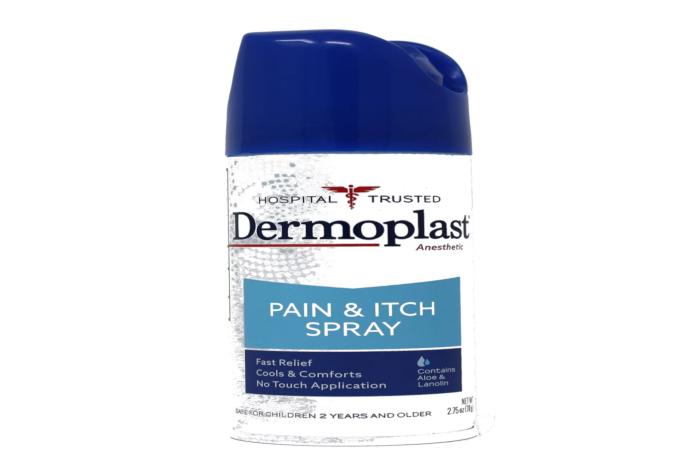Diaper rash is a common issue for infants and toddlers, causing discomfort and irritation for the little ones and stress for parents. When dealing with this condition, finding the right treatment can be challenging. Dermoplast is a popular over-the-counter product often used to soothe skin irritation. But is it safe and effective for treating diaper rash? In this article, we will explore whether Dermoplast is appropriate for diaper rash, including its ingredients, potential benefits, and alternative treatments.
What is Dermoplast?
Dermoplast is a brand of antiseptic and anesthetic sprays designed to relieve pain, itching, and irritation. It is commonly used for minor burns, cuts, and insect bites. The product contains ingredients like benzocaine, which is a local anesthetic, and menthol, which provides a cooling sensation.
Dermoplast is available in several forms, including sprays and creams. It is often chosen for its convenience and ease of application. However, when it comes to using Dermoplast on diaper rash, there are some important considerations to keep in mind.
Understanding Diaper Rash
Diaper rash, also known as dermatitis, is a common skin condition affecting babies and young children. It typically appears as red, inflamed skin in the diaper area, including the buttocks, thighs, and genital region. The rash can be caused by several factors, including:
Moisture: Prolonged exposure to wet or soiled diapers can lead to irritation and rash.
Friction: Rubbing of the diaper against the skin can cause chafing and irritation.
Chemicals: Ingredients in diapers or wipes may cause allergic reactions or sensitivity.
Infections: Yeast infections and bacterial infections can also contribute to diaper rash.
Dermoplast Ingredients and Their Effects
To determine if Dermoplast is suitable for diaper rash, it’s essential to understand its key ingredients and how they work.
Benzocaine
Benzocaine is a local anesthetic that works by numbing the area to reduce pain and itching. While it can provide temporary relief from discomfort, it is not a cure for the underlying cause of diaper rash. Additionally, some people may be sensitive or allergic to benzocaine, which could worsen the rash or cause other side effects.
Menthol
Menthol is a compound derived from mint oils that provides a cooling sensation. It can help soothe the skin and relieve itching. However, menthol may also cause irritation in sensitive areas or if used in excessive amounts.
Other Ingredients
Dermoplast may contain additional ingredients such as alcohol or preservatives, which could potentially irritate the delicate skin of a baby. It’s crucial to review the complete list of ingredients and consult a healthcare professional if you have concerns about any of them.
Is Dermoplast Safe for Diaper Rash?
Using Dermoplast on diaper rash is generally not recommended due to several reasons:
Sensitive Skin
A baby’s skin is particularly sensitive and can react differently to various substances. Dermoplast contains ingredients that might not be suitable for delicate skin areas, and applying it could potentially cause further irritation or allergic reactions.
Effectiveness
While Dermoplast may provide temporary relief from pain and itching, it does not address the root causes of diaper rash, such as moisture or friction. Therefore, it may not be effective in treating or preventing the rash in the long term.
Risk of Side Effects
There is a risk of side effects from using Dermoplast, including potential allergic reactions to benzocaine or menthol. These side effects can include redness, swelling, or increased irritation, which could worsen the rash rather than improving it.
Alternative Treatments for Diaper Rash
If Dermoplast is not suitable for treating diaper rash, several alternative treatments can be effective in managing and alleviating the condition:
Diaper Creams and Ointments
Specially formulated diaper creams and ointments are designed to protect the skin and promote healing. These products often contain ingredients like zinc oxide or petroleum jelly, which create a barrier between the skin and moisture. Applying these creams after each diaper change can help prevent and treat diaper rash.
Frequent Diaper Changes
Keeping the diaper area clean and dry is crucial in preventing diaper rash. Change diapers frequently, and allow the baby’s skin to air dry before putting on a new diaper. This practice helps reduce moisture and friction, which are common contributors to diaper rash.
Gentle Cleansing
Use gentle, fragrance-free wipes or a soft washcloth with water to clean the diaper area. Avoid using harsh soaps or wipes with alcohol, as these can further irritate the skin.
Natural Remedies
Some parents find relief using natural remedies such as coconut oil, aloe vera, or calendula cream. These natural products may have soothing and healing properties, but it is essential to ensure they are safe and appropriate for a baby’s sensitive skin.
Consult a Healthcare Professional
If the diaper rash persists or worsens despite home treatments, it is important to consult a healthcare professional. A pediatrician or dermatologist can provide guidance on appropriate treatments and rule out any underlying infections or conditions.
See also: What Can I Put On A Diaper Rash
Conclusion
In summary, while Dermoplast is a well-known product for soothing minor skin irritations, it is not recommended for treating diaper rash in infants. The sensitive nature of a baby’s skin and the potential risk of irritation or allergic reactions make it essential to choose treatments specifically designed for diaper rash. Opt for diaper creams and ointments, practice good hygiene, and seek professional advice if needed. By following these guidelines, you can help ensure your baby remains comfortable and free from diaper rash.


